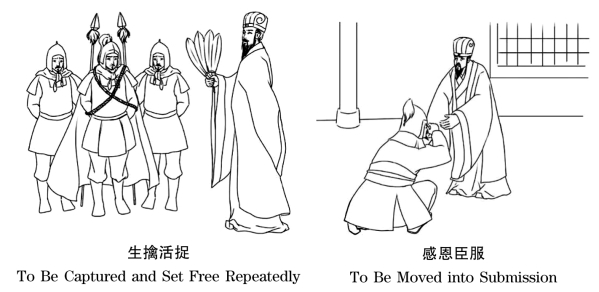《欲擒故纵》出处、故事、英文翻译、注释
17.欲擒故纵
yù qín gù zòng
【出处】《三十六计》第十六计:逼则反兵,走则减势,紧随勿迫。累其气力,消其斗志,散而后擒。兵不血刃,需有孚光。清代吴趼人《二十年目睹之怪现状》第七十回:“大人这里还不要就答应他,放出一个欲擒故纵的手段,然后许其成事。”
【成语故事】蜀汉建立后,作为西南夷地区的酋长,孟获率领十万人的军队准备侵犯蜀国。当时,诸葛亮正在实施北伐计划,但是,孟获的行为给他的计划带来了一定的阻碍。为了解决这个后顾之忧,诸葛亮决定亲自率领军队,先把孟获给摆平。聪明的诸葛亮又一次运用了计谋。诸葛亮事先在泸水附近的山谷中埋下伏兵,并用计引诱孟获出战,结果,孟获被诸葛亮抓住。诸葛亮考虑到孟获在西南蛮夷中威望很高,心想如果能让他心悦诚服,主动投降,才能使南方真正稳定下来。不然的话,西南蛮夷的各个部落还是会不停地侵扰自己的国家。于是,诸葛亮决定对孟获采取“攻心”战,毫不犹豫地把孟获放走了。孟获对诸葛亮说:“下次我一定能打败你!”诸葛亮笑了笑,没有回答。孟获回营后,拖走了所有船只,一直守在泸水南岸,阻止蜀军过河。诸葛亮乘敌人不备,从他们没有设防的下游偷偷过河,并袭击了孟获的粮仓。孟获很生气,说要严惩将士,激起了将士们的反抗,造成内部一片混乱。于是,诸葛亮的军队趁着孟获没有防备,又一次抓住了孟获。诸葛亮看孟获还是很不服气,又一次把他给放了。后来,孟获又用了许多计策,但都被诸葛亮识破了。他虽然多次被抓,但每次都被诸葛亮释放了。最后一次,诸葛亮放火烧了孟获的藤甲兵,第七次活捉了孟获。孟获终于被感动了,他真诚地感谢诸葛亮的七次不杀之恩,发誓不再攻打蜀国。从此,蜀国的西南部变得非常安定,诸葛亮这才带领军队,进行北伐。
【寓意】该成语原意是指要想真正地俘获敌人,往往要故意放松对其注意,然后在其放松警惕的时候再将他捕获,即使捕获了他,也要将他释放,让他感动后自愿臣服。现喻指为了俘获一个人,要让他从心里臣服,就必须先故意让对方放松警惕,对其示好,在其受到感化之后,心悦诚服,才能更好地控制他。

欲擒故纵
To Play Cat-and-Mouse Game
17.To Play Cat-and-Mouse Game
【Idiomatic Story】After the foundation of the Shu Kingdom during the Three Kingdoms period,MENG Huo,who was the chieftain of tribe in the southwest of China,intended to aggress the Shu Kingdom with 100,000 soldiers at the border area.At that time,the prime minister of the Shu Kingdom ZHU-GE Liang was on his way to the Northern Expedition on the Wei Kingdom with his troops.ZHU-GE Liang was quite interfered by MENG Huo's molestation for his plan of the Northern Expedition,so he decided to completely tackle the trouble by capturing the chieftain MENG Huo before the mission.
In order to capture MENG Huo,ZHU-GE Liang laid an ambush at the valley by the Lu-shui River for MENG Huo and his troops.MENG Huo was tempted to go into a battle and finally was defeated,and he himself was caught alive.
Because MENG Huo enjoyed a high prestige in the southwestern tribes,ZHU-GE Liang wanted to make MENG Huo moved into active submission for the sustainable stability of the southern part of the Shu Kingdom.In order to capture the mind of MENG Huo,ZHU-GE Liang decided to set MENG Huo free without hesitation.Before leaving,MENG Huo said to ZHU-GE Liang,“I will defeat you next time.” ZHU-GE Liang smiled to him as a response.
After returning,MENG Huo ordered his men to haul away all the boats and stationed at the southern side of the Lu-shui River to prevent the troops of the Shu Kingdom from crossing the river.However,ZHU-GE Liang commanded his troops to successfully cross the Lu-shui River secretly from the defenseless lower reaches,and occupied MENG Huo's commissary.MENG Huo was enraged by the failure and wanted to punish the responsible officers and soldiers,but this caused resistance and disorder in his troops.ZHU-GE Liang captured MENG Huo for the second time by taking the good chance.ZHU-GE Liang set MENG Huo free again when he found MENG Huo's malcontent.
From then on,MENG Huo had tried several attempts and tricks,but he was seen through by ZHU-GE Liang and was captured again and again,and he was released time after time.MENG Huo was recaptured for the seventh time when ZHU-GE Liang defeated him by attacking with fire on his rattan armored troops.MENG Huo was finally moved and felt indebted to ZHU-GE Liang's tolerance and generosity,and he gave up the plan of molesting the border area of the Shu Kingdom in the following years.
From then on,the southwest part of the Shu Kingdom became stable and peaceful in the following years.ZHU-GE Liang could start his mission of the Northern Expedition wholeheartedly.
【Implied Meaning】It originally means to make the enemy or opponent feel at ease and to capture him when he relaxes in vigilance.It is to capture the mind of the enemy or opponent by the free-andcapture game to make him moved into submission wholeheartedly.Now it is often used to refer to that if we want to capture a person completely,we should be kind to him to make him voluntarily surrendered.








